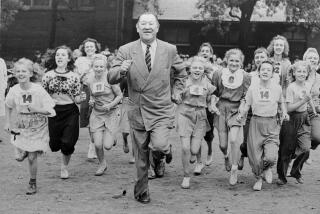Krabbe, Two Teammates Cleared for Olympics : Track and field: The IAAF rules that the German federation acted properly and orders standardization of tests. Torrence of the U.S. unhappy with decision.
- Share via
NEW ORLEANS — Sprinter Gwen Torrence won her second event Sunday in the U.S. Olympic track and field trials, but her celebration was laced with resentment at the International Amateur Athletic Federation’s decision earlier in the day to allow her German rival, Katrin Krabbe, to resume competition after serving four months of a four-year suspension.
“U.S. athletes, we know something is wrong,” said Torrence, who finished second to Krabbe in last year’s World Championships in the 100 and 200 meters, the two events that the former University of Georgia sprinter won here.
“I know she’s not a clean athlete. I’ve always had the feeling that she is doing something. I’m so disappointed with the decision, but we’re going to kick her butt.”
An IAAF arbitration panel reinstated Krabbe and two other former East German runners, Silke Moeller and Grit Breuer, on Sunday at London after two days of hearings.
They were suspended by Germany’s track and field federation in February for allegedly attempting to manipulate the results of a random drug test. In a test administered by officials in South Africa, where the three were training, they allegedly submitted clean urine samples produced by the same person.
Their appeal to the German federation’s legal commission was successful, but federation officials rejected the decision and asked the IAAF to rule.
While awaiting resolution of the case, the three women were allowed to compete, and although Krabbe chose to bypass the German trials two weeks ago, federation officials said that they would place her on the Olympic team in a relay if she were reinstated by the IAAF.
They said it also was possible that she could run in the open 100 and 200 if she recorded Olympic qualifying times before July 10.
Torrence said that she would not be surprised if Krabbe decides not to run at Barcelona. “She knows she can’t beat compete with us without drugs,” Torrence said.
The controversy has contributed to tension between former East and West German athletes and officials as they combine efforts to form a unified Summer Olympic team for the first time in more than three decades.
Thomas Springstein, who coaches the three women, said that the sentiment against them within the West-dominated federation was a “politically motivated plot against the East Germans.” But the German press has accused Springstein of administering banned performance-enhancing drugs to his athletes without their knowledge and manipulating the test results.
Officials from The Athletics Congress, which governs the sport in the United States, said Sunday that they could not comment on the IAAF’s decision until they have an opportunity to review it.
Ollan Cassell, TAC’s executive director and an IAAF vice president, said that he does not believe the decision represents a double-standard in the IAAF’s application of justice in regard to drug suspensions. Another IAAF arbitration panel recently rejected an appeal by U.S. quarter-miler Butch Reynolds, who was suspended for two years in 1990 after failing a drug test for an anabolic steroid.
Reynolds was allowed to compete in the U.S. Olympic trials last week after Supreme Court Justice John Paul Stevens upheld a lower court’s ruling. After Reynolds earned a place on the 1,600-meter relay team by finishing fifth in the 400 meters Friday, TAC submitted his name to the U.S. Olympic Committee for consideration as a member of the Olympic team.
On Sunday, the USOC’s executive committee decided in a meeting at Indianapolis that it would forward Reynolds’ name to officials of Barcelona’s organizing committee, although the IAAF has insisted that he will not be permitted to run in the Olympics.
More to Read
Go beyond the scoreboard
Get the latest on L.A.'s teams in the daily Sports Report newsletter.
You may occasionally receive promotional content from the Los Angeles Times.






